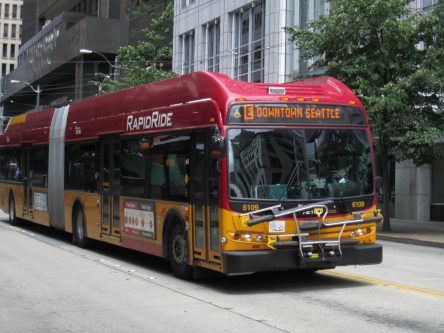Seattle Needs Plan B for Federal Funding

RapidRide E on 3rd Avenue Credit: SounderBruce
The same day the Seattle City Council approved a design for the Roosevelt RapidRide and endorsed plans to seek federal and state funding for the project, councilmembers were given a dismal prediction on the future of federal transportation funding.
"It's not a great picture," said Leslie Pollner, a federal lobbyist for the city. She told councilmembers to expect significant cuts by the federal government in domestic spending, including public safety and transportation.
The Roosevelt RapidRide project is expected to cost $70 million, with the goal of getting half of that funding from federal and state sources, said Councilmember Rob Johnson before the council voted to approve the preferred alternative Monday.
"If we are unsuccessful in securing in that the department will bring back to us a revised proposal," Johnson added.
The vote committed the city to fully funding the development phase of the project at a cost of $4.3 million.
The Roosevelt RapidRide, estimated to decrease travel times by 20 percent, runs between downtown and the Roosevelt neighborhood via Eastlake and the University District. The project is one of seven RapidRide projects planned in the city in a partnership between the City and King County Metro. A previous STB post by Calvin Tonini describes the latest iteration of the project.
The city plans to apply for federal government dollars through a Small Starts grant program for both the Roosevelt and Madison RapidRide projects.
According to Mafara Hobson, a spokesperson for the Seattle Transportation Department, SDOT seeks federal funding for all projects that are eligible.
Pollner, the city lobbyist, during the morning council briefing, told members the House's proposed Transportation, Housing, and Urban Development bill eliminates roughly $660 million from the capital investment section, hitting the Small Starts program hard.
"It would not fund all the projects needing an additional year of funding, like the Center City project would," Pollner said. "We are expecting to see better numbers on the Senate side, but of course (we're) waiting."
Despite a more challenging funding environment, Shefali Ranganathan, executive director of Transportation Choices Coalition (TCC) remains hopeful Seattle will receive at least some federal grant money for the RapidRide projects.
"These projects are very competitive - especially Madison BRT," Ranganathan wrote in an email. "I also think that as we adjust to a new funding environment, it should also make sense for SDOT to evaluate these projects and identify opportunities for state or local funding."
Ranganathan said if federal funding does not pan out TCC would advocate for cheaper capital improvements, including painting transit lanes red and investment of local money, to achieve the best parts of RapidRide, such as dedicated lanes and more frequent service.
"The bottom line is we are going to get these projects done, the question is how," Hobson wrote in an email. "So as you can imagine there's a prioritizing exercise involved as well."
"In short, today, I am not able to tell you what plan B looks like at this moment because we are figuring it out now," she added.